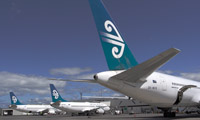20th Anniversary Issue: Environment
Asia-Pacific pioneered ‘green’ crusade
October 1st 2013
As early as 1994, airlines in the Asia-Pacific were at the forefront of initiatives to reduce emissions and achieve sustainability. Read More »
Twenty years ago, airline research into global warming and emissions and noise pollution included a decision by Japan Airlines (JAL) to dedicate two planes to “green” research. One aircraft gathered samples from the atmosphere during flights, a task a number of airlines are undertaking today. Another ‘naked’ JAL B747 freighter charted the environmental benefits of flying with an unpainted fuselage.
Far-sighted Cathay Pacific Airways had a full-time environmental officer and Singapore Airlines (SIA) and China Airlines (CAL) had specialist units developing “green” initiatives. Royal Brunei Airlines was sponsoring a rainforest study project.
More than a decade later, as climate change became a major global issue for governments and consumers, environmentalists demanded the airline industry “clean up its act” with a number of effective stunts.
 |
| Air New Zealand: a pioneer in biofuel testing |
Asia-Pacific carriers responded with a campaign, “We Care”, and airline chiefs went on the defensive, criticizing the volume of misinformation about airlines that was circulated by the global green lobby. Said SIA chief executive, Chew Choon Seng: “The industry as a whole has to consciously guard against being cast as the whipping boy for other agendas” and said it must be understood that airlines were responsible for only 2% - 3% of carbon emissions, yet the industry generated 8%-9% of global GDP.
A shift in the industry’s media strategy, emphasizing the industry’s commitment to halving carbon emissions from aviation by 2050 helped put the message across. But it did not stop governments from exploiting the airlines’ weakened public image by smacking on “green taxes” that did nothing much for green matters, particularly in Britain and the European Union.
From a technical standpoint, the industry continued to be a global leader in emissions reductions. To date, there have been more than 1,500 fights using various biofuels combinations. AirNZ was the first airline in the Asia-Pacific to conduct a test flight using biofuel. One of its B747-400s flew with a 50-50 combination of jatropha and jet fuel on two flights off the New Zealand coast. Even China, a laggard when it comes to agreeing to emissions targets in general, is constantly testing biofuels.
However, the political climate, when it comes to carbon strategies, is strained. At Orient Aviation’s third aviation environment conference, Greener Skies 2009, Tony Tyler, now the boss of the IATA, but then heading Cathay Pacific Airways, and Rob Fyfe, of AirNZ, were among those calling for a global emissions trading scheme. But they said climate change negotiations, be they at the International Civil Aviation Organisation (ICAO) or the United Nation’s climate change body, were moving at a “glacial pace”.
As the clock ticked towards 2012, when all airlines worldwide would come into the ambit of the European Emissions Trading Scheme (ETS), trouble was also coming. China said it would not pay European Union ETS, nor would the U.S, Russia, India and a host of other smaller countries. The China Transport Association, which includes the Mainland’s major carriers, told the European Union its emissions trading scheme was illegal when applied to Chinese carriers.
With a trade war a possibility, especially after China said it could block the sale of 10 A380s, valued $3.8 billion, to a China-owned airline, in protest over the EU ETS, things got more serious in Brussels. In November 2012, the EU “stopped the clock” on applying the ETS to non-European carriers for a year after a positive ICAO council meeting.
IATA director general and CEO, Tony Tyler told members at their annual general meeting in June this year, that if governments failed to find a solution, airlines would have to lead the way.